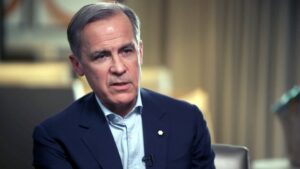Mark Carney, Canada’s “Mario Draghi” is ready to run
 TORONTO – What if Canada also has its Mario Draghi? A prestigious and authoritative banker, who worked for years at important international financial institutions, ready to make the big leap into politics? This hypothesis could materialize as early as the next federal election: Mark Carney is considering running for the Liberal Party, a hypothesis that has been circulating in the chambers of power for many months but which now buys more credit for contingent news of political news.
TORONTO – What if Canada also has its Mario Draghi? A prestigious and authoritative banker, who worked for years at important international financial institutions, ready to make the big leap into politics? This hypothesis could materialize as early as the next federal election: Mark Carney is considering running for the Liberal Party, a hypothesis that has been circulating in the chambers of power for many months but which now buys more credit for contingent news of political news.
The start of new speculation about Carney’s future was Catherine McKenna’s announcement about her future: the current Federal Minister for Infrastructure, formerly in charge of the Federal Environment Department, has decided that she will not stand for re-election at the next election. An unexpected move, but one that clears a box in the Federal District of Ottawa Centre. Another clue is that Carney lives in the capital a few miles from this constituency.
In addition to this, Carney himself is a personal friend of the current Infrastructure Minister. During the press conference at which McKenna announced his intention to leave active politics in the next legislature, the speech slipped precisely on the former governor of Bank of Canada and the possibility of his candidacy in the ranks of the Liberal Party.
“I will not be part of the process that will lead to this type of decision – underlined the government representative – but Carney would do very well in politics. I have been telling you for years that you should apply, not least because I will never tire of repeating that the economy and the environment always go hand in hand. Mark Carney is a good friend. I think it could really make a difference.”
It is clear that such a candidacy would bring obvious benefits to the Liberal Party and, at the same time, should the grits win the next federal election, for Carney the doors of government would open for a top job in the Trudeau executive.
Carney, 56 years old last March, has held positions of great prestige and relevance in his career. For 13 years Carney worked for Goldman Sachs, before joining the Finance Department in 2004, where he held numerous leading roles.
Starting in 2008 Carney became governor of Bank of Canada by picking up the baton of David Dodge, and leading the country’s monetary policies through the difficult phase of the 2009 recession.
After becoming chairman of the Financial Stability Board and finishing his term at the Canadian Central Bank, Carney became governor of the Bank of England in 2013, a post that lasted until March 2020.
Carney has made no secret of his unconditional support for the Liberal Party in recent months, sending clear signals to Prime Minister Trudeau and not ruling out a possible candidacy. Now the circle could close, with Mr McKenna’s step back and the possibility of having a seat in Ottawa.


